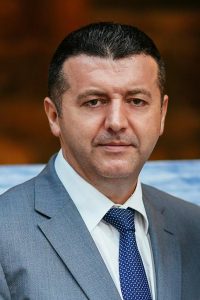 Dr Orhan Dragaš is a Serbian expert on security and international relations. He is the founder and director of the International Security Institute, based in Belgrade (www.isi-see.org). He is the author of numerous expert articles, newspaper columns, as well as the books The Modern Intelligence-Security Community, Utopia or Reality, Two Faces of Globalization – Truth and Deceptions, The End of the Russian World – Russia, Ukraine, Balkans, Russia – From a Failed State to a Rogue State, Ukraine – Crime without Punishment, and The Power of Perception – When Reality Loses the Battle.
Dr Orhan Dragaš is a Serbian expert on security and international relations. He is the founder and director of the International Security Institute, based in Belgrade (www.isi-see.org). He is the author of numerous expert articles, newspaper columns, as well as the books The Modern Intelligence-Security Community, Utopia or Reality, Two Faces of Globalization – Truth and Deceptions, The End of the Russian World – Russia, Ukraine, Balkans, Russia – From a Failed State to a Rogue State, Ukraine – Crime without Punishment, and The Power of Perception – When Reality Loses the Battle.
Biography and education
Dr Orhan Dragaš was born in Prizren, Yugoslavia. He finished elementary school in Dragaš (Yugoslavia, Kosovo), high school for electrical engineering in Prizren and university (graduate technologist) in Belgrade. He received his PhD in 2014 at the European University of Brussels on “Modern National Security Systems and the Intelligence and Security Community”. He continued his post-doctoral studies at the London School of Economics and Political Sciences (LSE), course “Business, International Relations and the Political Economy” (2018), Yale University (Yale School of Management), “Accelerated Management Programme” (2019), Oxford University’s “Executive Leadership Programme” (2020), Harvard University (Harvard BOK), “Higher Education Teaching Certificate” (2021), as well as at Harvard Business School, course Strategy Execution (2022).
He is married to Nena, with whom he has four children, a daughter Anđela, and sons Luka, Andrej and Stefan.
Scientific and research work
Dr Orhan Dragaš is the founder of the International Security Institute, based in Belgrade. This expert, non-governmental organisation brings together experts in the fields of law, security, diplomacy, economics, communications … and cooperates with numerous governmental and expert organisations in Serbia, the Balkans and Southeast Europe. He is involved in research and consulting in the fields of politics, security and international integration, especially the EU and NATO.
Dr Orhan Dragaš is the European Commission’s (EU) expert for migrations and internal affairs. He is member of Chatham House (UK), The Royal Institute of International Affairs and member of RUSI – Royal United Services Institute (UK).
In early 2005, he founded the Faculty of Diplomacy and Security, the first of such profile in Eastern Europe. As lecturers, the most influential professors, scientists and researchers from Serbia and the countries of the region worked at the Academy.
He publishes interviews and columns in the media in Serbia, Balkans and worldwide on current political, economy and security topics, and articles on international relations and security in scientific journals and expert conferences.
Books
Dr Orhan Dragaš published The Modern Intelligence-Security Community, Utopia or Reality, in 2009, which in 2018 had a second, revised and amended edition and serves as the literature for teaching international relations and security at universities in Serbia and Eastern Europe.
In June 2019, he published Two Faces of Globalization – Truth and Deceptions, which had a second, supplemented edition and the edition in English in the autumn of the same year. This study deals with the state of globalization and its aftermath ten years after the global crisis of 2008.
The End of the Russian World – Russia, Ukraine, Balkans was published in Serbian and English. This analysis deals with the events between September 2021 and September 2022 and various aspects of a phenomenon that lasted much longer: the expansion of Russia’s influence in an attempt to create its mythical-quasi-historical concept of the “Russian World”. This period also includes Russia’s aggression against Ukraine – a historical event we are witnessing.
In September 2023, Dr Dragaš published Russia – From a Failed State to a Rogue State. The texts in this book were written between September 2022 and August 2023. They represent a continuation of the short essays published in the previous book, The End of the Russian World. Even though collected in two books, they are parts of the same research series, which tries to follow, analyse and interpret in real time the most significant event for the current generation of Europeans – Russia’s aggression against Ukraine.
Ukraine – Crime without Punishment is a continuation of a research series that began with the books The End of the Russian World and Russia—From a Failed State to a Rogue State. These books analysed in detail the Russian aggression against Ukraine, its historical, political, and social causes, and the catastrophic consequences, not only for Ukraine but also for Russia, the Balkans, Europe, and the whole world. This collection of columns covers the period from August 2023 to the present day. It records the most important events related to the Russian aggression against Ukraine but also something much more serious—it documents the hypocrisy of a large part of the international community.
The book The Power of Perception – When Reality Loses the Battle was published by the renowned British publishing house Chiselbury. It poses a fundamental question: What happens to the world when no one believes in a shared reality anymore? At a time when facts lose out to feelings and trust gives way to reputation, societies lose the foundation for dialogue. In this process, truth ceases to be a social practice and becomes a marketable commodity. It is no longer a question of who controls the truth, but how it is measured – by the number of likes, shares, and emotional reactions.
